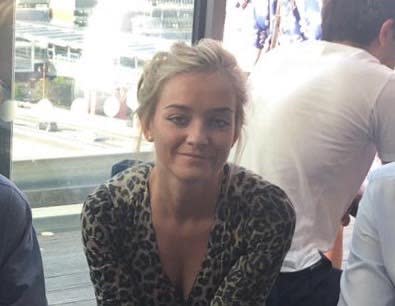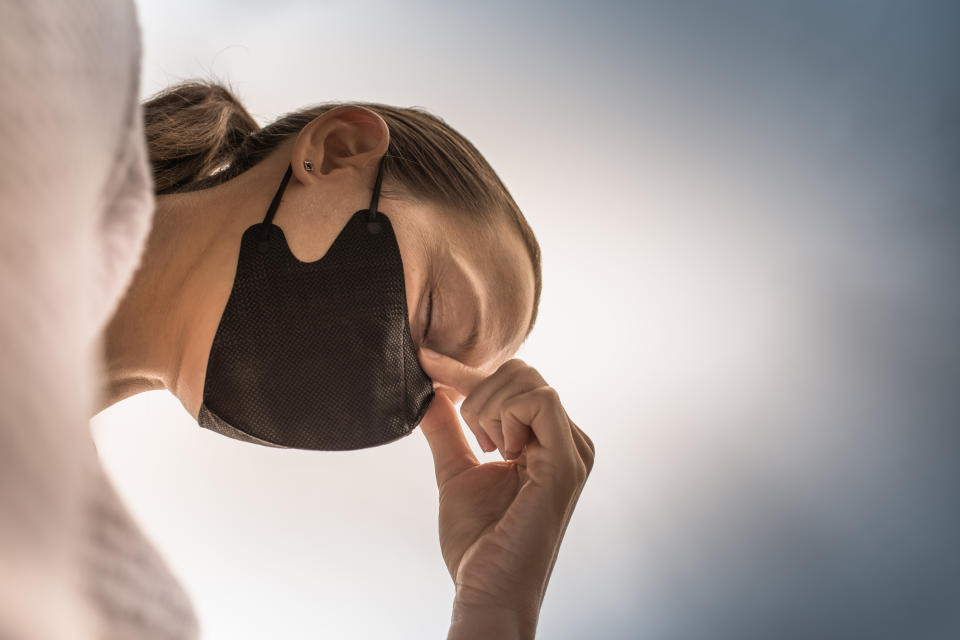Rape survivor who suffers from PTSD calls for greater awareness of face mask exemptions
Watch: Rape survivor explains why we need greater understanding of face mask exemptions.
A rape survivor whose PTSD is triggered when her mouth and nose are covered is calling for greater understanding of face covering exemptions.
Wearing a mask can cause Georgina Fallows to suffer traumatic flashbacks of being attacked.
Having been verbally abused for not wearing a mask in public, she is now calling for a public health awareness campaign about the exemptions and for an official badge to make clear who is exempt from the rules.
While walking home one night several years ago, Fallows was attacked and raped. To stop her from screaming her attacker put his hand over her mouth and now the 30-year-old solicitor from London cannot bear to have her mouth covered.
“I suffer from something called Post Traumatic Stress Disorder (PTSD) and one of the symptoms of that can be incredibly immersive flashbacks,” she tells Yahoo.
Fallows says wearing a face covering can take her right back to the night of the attack.
“I won’t be able to hear what anyone is saying or see anybody, and it’s absolutely terrifying,” she adds.

The distress Fallows suffers amid flashbacks can be so severe that she has had to be hospitalised, restrained and sedated on several occasions.
“So wearing a face mask is is not an option,” she says.
Face coverings are mandatory of most people when in many indoor public spaces in England, including shops and on public transport.
But there are exemptions for people for whom, like Fallows, “putting on, wearing or removing a face covering” will cause “severe distress”.
People who cannot wear a mask because they suffer from a physical or mental illness or disability are also exempt, with an official note available to download from the government website.
But Fallows is concerned the rules aren’t clear enough and there are fears the notes could be misused by people who do not have a valid reason not to wear a face covering.
Equally the lack of public awareness about exemptions can leave those who are exempt open to suffering verbal abuse from people challenging their reasons for not wearing a covering.
Fallows recalls a particular upsetting incident while getting her haircut after the first lockdown when another customer interrogated her about her lack of mask.
“I rang the salon beforehand to explain that I was exempt from wearing a covering and offered to show a letter from my doctor, which I don’t actually have to do,” Fallows explains.
“They were absolutely fine, but another customer went off about it. She was incredibly aggressive.”
Since then, Fallows says she has been regularly challenged when she goes in to enclosed public spaces without a mask, causing her to avoid shops and public transport and making her feel like a “prisoner” at home.
“I won’t even go to Sainsbury’s because I fear the abuse I’m going to get,” she says.
Watch: Tests reveal differences in the effectiveness of certain types of face masks.
Fallows says she does understand why people get upset when they see someone not wearing a face covering, particularly if the reason they are abstaining isn’t immediately obvious.
“COVID has touched all of us in the most horrific way and I do understand that there are people that are truly worried and concerned,” she explains.
“I suffer from anxiety disorder, so the last thing I want to do is make anyone anxious about me not wearing a covering.”
Fallows also wants people to know that just because she isn’t wearing a mask doesn’t mean she isn’t respecting every other government recommendation, like social distancing and hand washing.
“I am as fearful for myself and my family as anyone else,” Fallows explains.

Invisible exemptions
Fallows is calling for a public awareness campaign regarding the exemptions to face mask rules, particularly for those who suffer from an “invisible” condition.
“If you actually look at the government list so many of the exemptions apply to something, which would not be obvious to the general public,” she explains.
She has joined forces with seven mental-health and disability charities, including Mind, Sense, Alzheimer's UK and Disability Rights UK, in sending a letter to public health minister Jo Churchill, disability minister Justin Tomlinson and former disability minister Penny Mordaunt urging the government to take action.
Fallows also wants the government to consider backing the Hidden Disabilities charity’s sunflower lanyard, which is already being used to identify those exempt from wearing a covering and is widely recognised.
The hope is that if the scheme is backed by the government it will add an extra layer of protection for those who are exempt.
“For the people who feel comfortable enough to wear [a lanyard], we are hoping that people will be less likely to challenge them for not wearing a covering,” she explains.
But, as Fallows also points out, a badge “is no substitute for greater public understanding” of why people might not be able to wear face coverings and that this reason may be invisible.
“It wouldn’t take much, you would think, for every single interview that the government gives talking about extra restrictions such as face masks to also add, ‘apart from those that are exempt’. But that message is just not getting out there,” she says.
“And the list [of exemptions] on the government website is just not enough. We’ve got tonnes of people coming forward saying ‘this is an issue for me’ and it is causing so much suffering.”
Fallows says people who do not wear a covering through choice do a “genuine disservice” to those who aren’t able to wear one and are exempt.
She may be exempt from wearing a mask, but that doesn’t mean she is an anti-masker, as some people have wrongly assumed.
“I have no political stance, I’m not a doctor, I’m not a scientist, I’m not informed on that. As far as I'm concerned if the government says you should wear a mask you should wear one, unless you are exempt,” she explains.
“But the point is that these exemptions do exist, the government has recognised it. So it's not that we're going against policy we are completely in line with it, we just want them to be more vocal. And for people to respect it.”
Help and support for anyone who has been a victim of rape or sexual assault is available at:
Victim Support Tel 0808 1689 111
The Survivors Trust Tel 0808 8010 818
Survivors UK (for male victims of sexual assault) Tel 0203 598 3898
24-hour freephone National Domestic Abuse Helpline, run by Refuge, Tel 0808 2000 247
Rape Crisis national freephone helpline on 0808 802 9999
Samaritans (24/7 service) – 116 123



